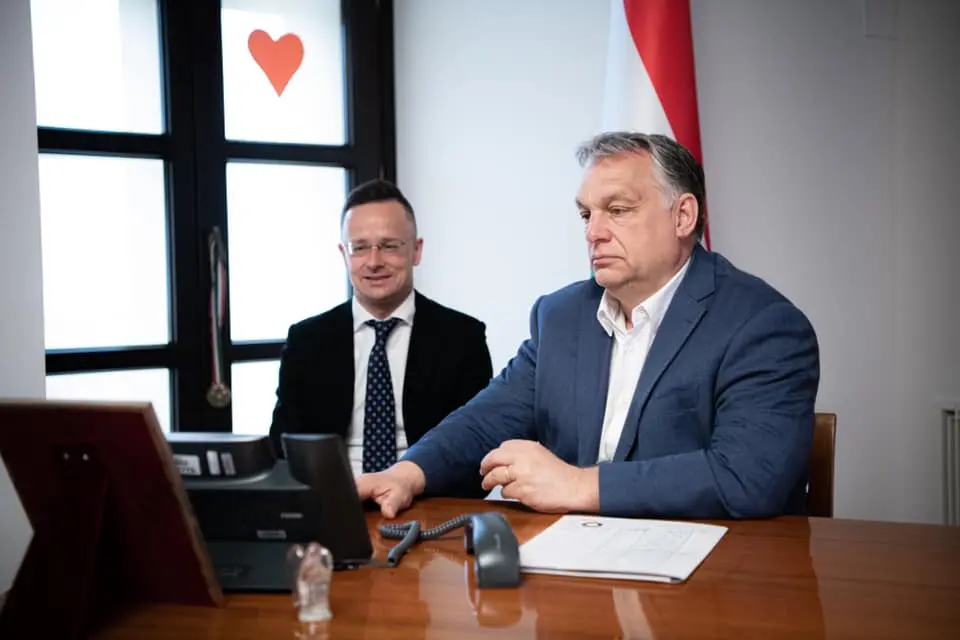Orbán will fire his foreign minister? Here is what he said about Mr Szijjártó

Addressing an event held by the Hungarian Foreign Affairs Institute (MKI) on Monday, Prime Minister Viktor Orbán said national interests formed the foundation of Hungarian foreign policies.
At the conference in Budapest celebrating the 50th anniversary of MKI’s foundation, Orbán said great powers with military and economic power earned respect and should not dish out warnings to their partners.
“We Hungarians are not a great power; nevertheless we claim the right to an independent foreign policy, and others who are larger than us must accept our demand,” he said.
A country of such ambition and size must maintain a strong stance, the prime minister said. It must not run scared in a tough situation but rather square up to the conflict, he added.
Orbán said Hungary was successful on the international stage precisely because notwithstanding its small population of ten million, it still resolutely pursued an independent foreign policy.
The prime minister said Hungary should not heed the “siren call” to “teach the country a lesson” in how to pursue a “well-behaved” foreign policy.
Orbán said that throughout its history, Hungary had always been capable of pursuing a sovereign and independent foreign policy centred around the prime minister. He said countries with more ambitious goals relative to their size and economic power had to “have a tight hold on the reins of foreign policy”, adding that in Hungary’s constitutional system this meant that
“it’s good to have the prime minister holding them”.
He insisted that a country with no relative advantages that wants to pursue an independent foreign policy must take a radical position. Such countries, he said, should have a broad vision and specific long-term goals and a strategy for becoming a strong country respected by the rest.
The prime minister noted that the previous government had had a “witty” argument against this by advising Hungary to “dare to be small”. He said Hungary should not want to be the “pupil” of another world power, but rather its own master.
Orbán said a radical position was necessary from a tactical standpoint so that the country could make certain concessions.
He said Hungary did not go into petty details such as the mechanism for distributing migrants, “because these are technical, not essential”. “The essential question for a Hungarian is whether migration is a good thing in any way whatsoever,” he said.
Orbán said Hungarian foreign policy asked questions not in a way that harmed Hungary’s prestige but enhanced it. The idea was not only to express Hungary’s standpoint but to defend it intellectually and politically, and fight for it, too, “turning it into something of a trademark”, he said. “This is, in effect, Hungarian soft power,” he added. Orbán said it was this that allowed Hungary to form a coalition with those who “aren’t able to say what we say” but had the same goals.
The prime minister said the common view that radical critiques of an issue led to isolation rather than to prestige was mistaken and “doesn’t match my experience”.
Orbán said Hungarian foreign policy had seldom been as active or broad as in recent years, noting the policy of opening to the East and South, intensive trade and investments and connectivity.
“An intensive network of western relations, a booming opening to the East and South, speed, ability to act, trade, investments and connectivity” brought Hungary prestige rather than isolation, he said.
He said national interests formed the foundation of Hungarian foreign policies combining “the best elements of idealism and realism”. The word “national” was “the idealistic element” based on the nation as an idea, while the word “interest” equalled “realism”, denoting what was necessary, useful and practical, he added.
The most important task of a foreign policy based on the national interest, he said, was to define the national interest in every situation and take action on that basis. Such foreign policy, Orbán said, had intellectual content and carried principles and values while demanding flexibility from policymakers.
Orbán said he believed in the arsenal of broad and open networks and the “smart use of soft power”, which he said was where the strength of Hungarian foreign policy lay.
The prime minister said that as Hungary’s foreign relations became more and more diverse, there was a growing need for preparatory work defining the national interest from the most qualified professionals.
He noted that in the future, MKI will be overseen by the prime minister’s political director under the aegis of the Prime Minister’s Cabinet Office.
Read also:
- Former Ukrainian PM planned meeting Orbán but wasn’t let out of Ukraine? – Read more HERE
- Why are more than a million Hungarians very sad today, while Romanians celebrate? – Details in THIS article
Source:






Orban said that to have an independent foreign policy as a smaller country Hungary needs to take a “radical” position. History is full of leaders who took “radical” positions: Lenin, Mao Tse Tung, Hitler, Pol Pot. Radicalism appeals to the ignorant who will gamble with the lives of their countrymen which virtually every time ends in some kind of disaster. Orban, however, talks out of both sides of his mouth by claiming that he is “conservative.” Conservatism is the antithesis of radicalism. The whole ideology of Fidesz is a mass of faulty contradictions designed in a Russian political laboratory.
How quaint. The Mouse that Roared – somebody wrote a book with this title: https://en.wikipedia.org/wiki/The_Mouse_That_Roared
Other radicais were:
Pericles; Augustus Caesar ; Henry the Eight ;Napoleon; Garibaldi ; Bismark ;
Jefferson ; De Gaulle; Churchill; Gorbachev; Margaret Thatcher;Ronald Reagan.
Unfortunately, Orban has not studied history. Hungary has not had an “independent” foreign policy in the past 200 years.